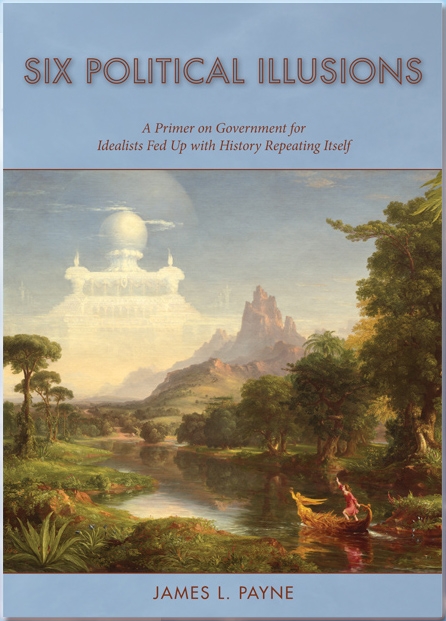Book Review
By Katherine A. Carroll, NTP
 Six Political Illusions: A Primer on Government for Idealists Fed Up with History Repeating Itself
Six Political Illusions: A Primer on Government for Idealists Fed Up with History Repeating Itself
By James L. Payne (ISBN: 978-0-915728-20-6; Lytton Publishing Co., www.LyttonPublishing.com, 2010; paperback, 126 pages, $9.86; Kindle $9.37)
Politics, and more precisely, our correct understanding of the process of government, is crucial to health and health freedom. There are political illusions identified in this excellent, short book Six Political Illusions, which, if we continue to subscribe to, will undermine both our health and our health freedoms. The National Health Federation is the oldest health-freedom organization on the Planet, now nearly 60 years old. We attribute our success in part to understanding and avoiding the six political illusions brought forth in this cogent book: the power of volunteer forces over that of big government primarily.
Many suffer under the illusion that if something is to be done right, then government’s your man. The author takes each of the six illusions and shows the power of the people apart from their government to get things done more directly, cheaply, and effectively. This book puts the power firmly back in our own hands as we disengage from each illusion. Even the author, having completed his degree in Political Science, admitted that he was only then learning to stop believing in these myths. So no matter where you are in your political life, it is worth checking your belief system against this “gold-standard.”
In 1889, Edward Bellamy published a utopian novella called Looking Backward. His vision – of Big Government compassionately and effectively running the Nation from the top down – spawned a huge movement devoted to “salvation through government.” This book was a thinly veiled political philosophy disguised as fiction. But this fiction was implemented by the Roosevelt and Wilson administrations as they set a precedent for the Federal government acting as a comprehensive problem solver. The expansion of government snowballed. Today, even though one-quarter of the population still holds this view, the illusions we were reared with are hard to break. The paradox is: I don’t believe in big government; I want more of it. Strangely, it isn’t confined to the United States but is a Global problem despite the fact that bad governments rank above plagues and earthquakes as enemies of the human race.
First impressions are hard to overcome. Author James L. Payne takes the reader through six illusions about Big Government and destroys each myth leaving the bare (often economic) facts so an appropriate analysis of the phenomenon of first impressions can be made and a true understanding based on reality can emerge. His stated goal is “not to abolish the distortions of politics, but merely to help thoughtful reformers stay clear of them.”
Challenging these illusions is key to maturing politically and in our World view. The book should be recommended reading for everyone developing their political perspective and as a reference to gauge our own political astuteness even if we’ve been participating in the political process for years. Many examples are given of leaders operating under these illusions and the wasteful, inefficient, or even destructive and freedom-limiting results these illusions engender. Contrasted to this approach is power wielded directly by the people – volunteers or private enterprise – and how contrastingly effective and efficient it is in proving that the illusion that we need government involvement is false.
The book actually dovetails nicely with concurrent reading of a very old book, Henry Hazlitt’s Economics in One Lesson. While written in the 1940s, it lays a firm foundation of a healthy economy and how Big Government practices interventions that drive growth of Big Government while impoverishing the people. To understand economics in a simple way will help to clear your mind of the illusions we have all been caught up in and return our thinking to a sound, sensible, logical pattern that will lead to smaller government, more benefits to the economy and the people, and more individual empowerment as well.
ObamaCare, health, health freedom, environmental care – we can’t escape government. The a-political stance will only find you pushed from one side of the fence to the other at some crucial decision that affects you. It’s best to enter the game without the illusions that have deceived both policy-makers and voters. This book is highly recommended as a must-read for anyone at any stage of their political life.
Here is a summary of the six political illusions but don’t let it serve as a condensed synopsis so that you might avoid reading the short book because the examples in the book are too logical not to read:
- The Philanthropic Illusion: Belief that the government has vast monetary resources of its own when in reality it is operating on a tax-spend basis, extracting our money by force and acting as a redistribution channel.
- The Voluntary Illusion: The tax system is voluntary, right? Wrong. We want to believe that the government action is not based on the use of force, but it is.
- The Illusion of the Frictionless State: Government involvement introduces complexities that emerge as friction – the waste, losses, and inefficiency in the system. But some still believe that transfer of resources can occur with negligible overhead costs. Myth.
- The Materialistic Illusion: The belief that money alone buys public-policy results (socially desirable behavior) when in fact the people receiving the money must have the skill and motivation to appropriate the funds constructively. Support often produces the opposite of the intended result: incapacitation. Transcend the assumption that if you give money to help the poor, you necessarily help the poor. It often does more harm than good.
- The Watchful Eye Illusion: The idea that government has greater knowledge and wisdom than the public when in fact “the laws that establish regulatory systems for health, safety, commerce, and transportation do not require that those who write regulations have any definite ability or qualifications.” Amazing. One can simply walk right off the street and get a job in a bureaucracy. It is an illusion to believe that government is morally, intellectually, and administratively superior to its people acting to create similar results.
- The Illusion of Government Preeminence: The belief that government is the only problem-solving institution in society. Elections focus on what government can do when the people, acting in smaller, organized groups as volunteers, are infinitely more powerful in their effect and without the waste and inefficiency. This inappropriate belief will lead to the demise of limited government. Government action generally displaces and weakens action in the voluntary sphere by robbing it of function, extracting resources from it, and imposing demoralizing and burdensome regulations upon it.
If some of these illusions are your “reality,” then it’s time to check your ego at the door and get the perspective of true reality. That is unless you really want the increasing control of Big Government in your life, including your health.

No Comments Yet